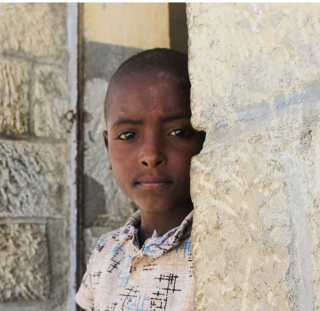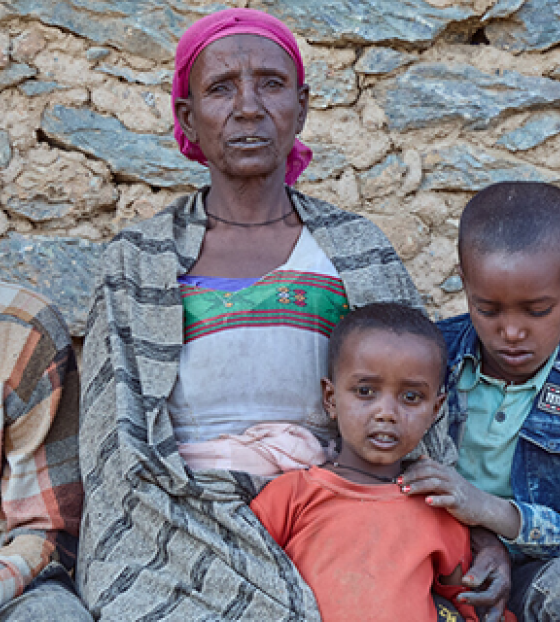
Voices from Tigray: A grandmother’s fight to keep her family alive
Letemariam walks 36km every week to earn money to feed her orphaned grandchildren but it is never enough. With no school meals at his school, grandson Abraha's dream of becoming a teacher hangs by a thread.
Letemariam walks 36km each week to earn what she can to feed her orphaned grandchildren, but it’s never enough to buy more than a milky drink. Hunger is wearing this family down. When the Mary’s Meals team met them, they only had a small amount of maize left to survive on – there will be nothing left of it now. Their last remaining glimmer of hope is the eldest grandson Abraha’s dream of becoming a teacher, but his passion for learning is no match for the persistent hunger that not only threatens his future, but his life.
Beneath his quiet demeanour and sorrow-filled eyes, Abraha has a determined resilience that would astound you. At the age of 13, he’s already gone through more pain and loss than most people face in a lifetime.
It’s clear his strength is passed on from his grandmother, Letemariam. Abraha and his two brothers (six-year-old Alene and Robel who is four) live with her after their mother died in childbirth during the Covid-19 pandemic, and their father was killed in the brutal conflict in Tigray which followed soon after.
Remembering those first few days of war, Letemariam says: “We left, and I was carrying the children with me. We hid in a cave for three days. We had no food and no water. On the third day, we drank the water in the cave and the children were vomiting.”
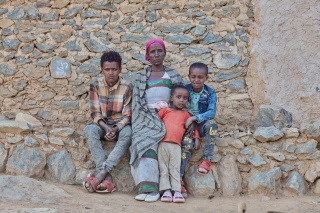
The past few years have been awful for the people who call Tigray home. The deadly civil war was met by a terrible drought and now the dry land that they once farmed so diligently no longer produces anything for them. Letemariam and Abraha’s family are no exception.
Before the war, Letemariam’s son (Abraha’s father) and her son-in-law (who was also killed in the war) supported the family and they all had enough to eat. Now, the children are too young to help, and her husband is too elderly to farm. “The drought means the agriculture is not working,” she tells us. So, their land lies empty of crops.
She continues: “Before the war, at least these three children [Abraha and his brothers] had a father and enough to eat. After the war, all is on my shoulders. That burden is now on me. It’s devastating.”
Somehow, despite the unimaginable loss she endured, Letemariam found the strength to keep going. Every few days, she travelled 36km on foot to buy cooking materials – like pots – which she would try to sell in other towns for a small profit. Despite her valiant efforts, the little money she made was never enough, and with every day that passed, hunger tightened its grip on her last remaining family members.
“I would use the small profits to purchase food,” she says, “but I couldn’t afford n’jera or bread. It was just enough for a ‘milk drink’.”
Letemariam has since injured her leg, but once a week she still makes the gruelling 36km journey out of desperation to feed her family.
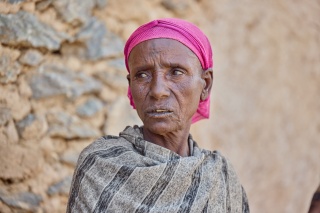
When we met Letemariam and her family, they had 2kg of maize left over from a sack of food they had been given as compensation for her son’s death, but they didn’t know how much longer it would last.
“We don’t eat a proper breakfast, lunch or dinner. We try to cook what we can but we don’t grind it. We used to grind cereals into bread or n’jera, but now I can’t afford to pay for the wheat to be ground. We try to cook it plainly and make it last longer. Food that would normally last a few days, we try to make last a whole week.
“Sometimes the children are crying when the meals are minimised. What we have left is not more than 2kg. We don’t know what we will do when it runs out.”
Letemariam explains: “There is a proverb in our community, instead of asking ‘how are you,’ you simply observe people, as their faces explain more.” Observing Letemariam and her family, you can certainly see sorrow etched on their faces, but behind their eyes is a fierce determination. It’s young Abraha’s determination to keep going to school that catches us most off-guard.
His grandmother explains that she wanted to move to another area with all the children, but Abraha insisted otherwise because he “wanted to come back to school”.
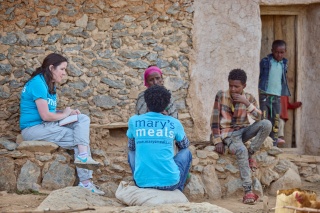
Abraha’s commitment to learning is clear, but sadly hunger is stealing more of his potential with each passing day. He says: “Education is very important to know more about yourself, to understand more about yourself and your environment. I want to be a teacher because I like reading and I want to use my mind. I like to play and discuss issues, but coming back here now I feel bad because there is no food.”
Letemariam tells us that everyone in the community is in the same situation. Before the war, there were more than 1,200 students at his school, Gendet Primary School. Now, almost half of them don’t attend.
Abraha’s focus might be on the threat to his education, but Letemariam has even greater fears for the months ahead. Both of them are clear about how different things could be if there was a school feeding programme at his school. Letemariam explains: “Before school, some of the children are crying in the house. The community meeting [with Mary’s Meals] gives us hope. I simply say that if there is a feeding programme here, it will prevent our children from death.”
The community meeting took place to explore the possibilities of serving Mary’s Meals at Gendet Primary School. It’s a partnership that would change everything for Abraha and his family and it’s a school we’re ready to begin serving, when funds allow.
Without reliable daily meals, there is much more than education on the line for Abraha. By the time you’re reading this, the 2kg of food the family had left will have run out. Please help us to reach Abraha and the rest of the children attending Gendet Primary School, before it’s too late.
